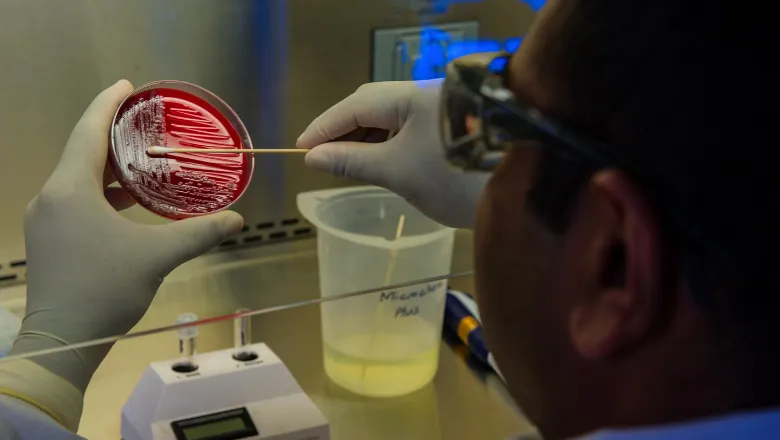Reliable cost-effective antibody tests have potential to help diagnosing COVID-19 disease both when patients are unwell and after they have recovered. The challenge is to work out which technology is best in which clinical situation. We compared 10 different technologies and surprisingly found that some of the quick single-use kits (LFIAs) that are like pregnancy tests, are as accurate as our sophisticated laboratory technologies.
Professor Jonathan Edgeworth, from the Centre of Clinical Infection & Diagnostics Research, School of Immunology and Microbial Sciences
08 June 2020
Quick antibody tests may reliably diagnose COVID-19 in hospitals, study finds
Scientists have shown that affordable, quick and easy-to-use disposable antibody tests reliably detect antibodies against novel coronavirus particularly if used more than 20 days after the start of symptoms.

The authors conclude that these lateral flow immunoassays (LFIAs), similar to pregnancy tests, may have considerable benefit in health care settings where quick answers are required or that don’t have easy access to a laboratory.
The study reported recently on MedRxiv by a team from King’s and Guy’s and St Thomas’ NHS Foundation Trust, compared multiple SARS-CoV-2 antibody tests against blood samples taken from patients admitted to St Thomas’ Hospital with confirmed COVID-19.
10 commercial tests were compared against a sophisticated in-house enzyme-linked immunosorbent assay ELISA which was developed in research laboratories at King’s. Two of the commercial tests were also ELISA assays, and the other eight tests were lateral flow immunoassays, which can be used in any suitable setting by any trained healthcare professionals, to accurately detect the presence of antibodies.
Another advantage of LFIAs is that they are quick and easy to use. One drop of blood or serum is applied to the test cartridge with a drop of liquid that soaks through the cartridge. Ten minutes later a band appears along the strip if COVID-19 antibodies are detected.
The study found that almost all patients develop antibodies after 20 days from the first day of symptoms and that some of the LFIAs were as good as the sophisticated ELISA assays, with an overall accuracy of 97%. This contrasts with some earlier studies that concluded LFIAs were not accurate enough for clinical practice.
Since completing this report the team of researchers have performed further rigorous laboratory validation on over 500 samples. The best performing LFIA has been selected for a pilot COVID-19 antibody service at St Thomas’ Hospital.
He continued: “Encouraged by these findings we are piloting LFIAs in the hospital to give doctors a quick reliable answer in a range of clinical settings. Early results are encouraging and if all goes well we could start evaluating these tests performed in A&E or even in the community, rather than in the laboratory. This would give a much quicker result. Another advantage is they are designed to work on a pin-prick of blood which would save a lot of time and effort compared with providing a whole tube-full of blood.”

